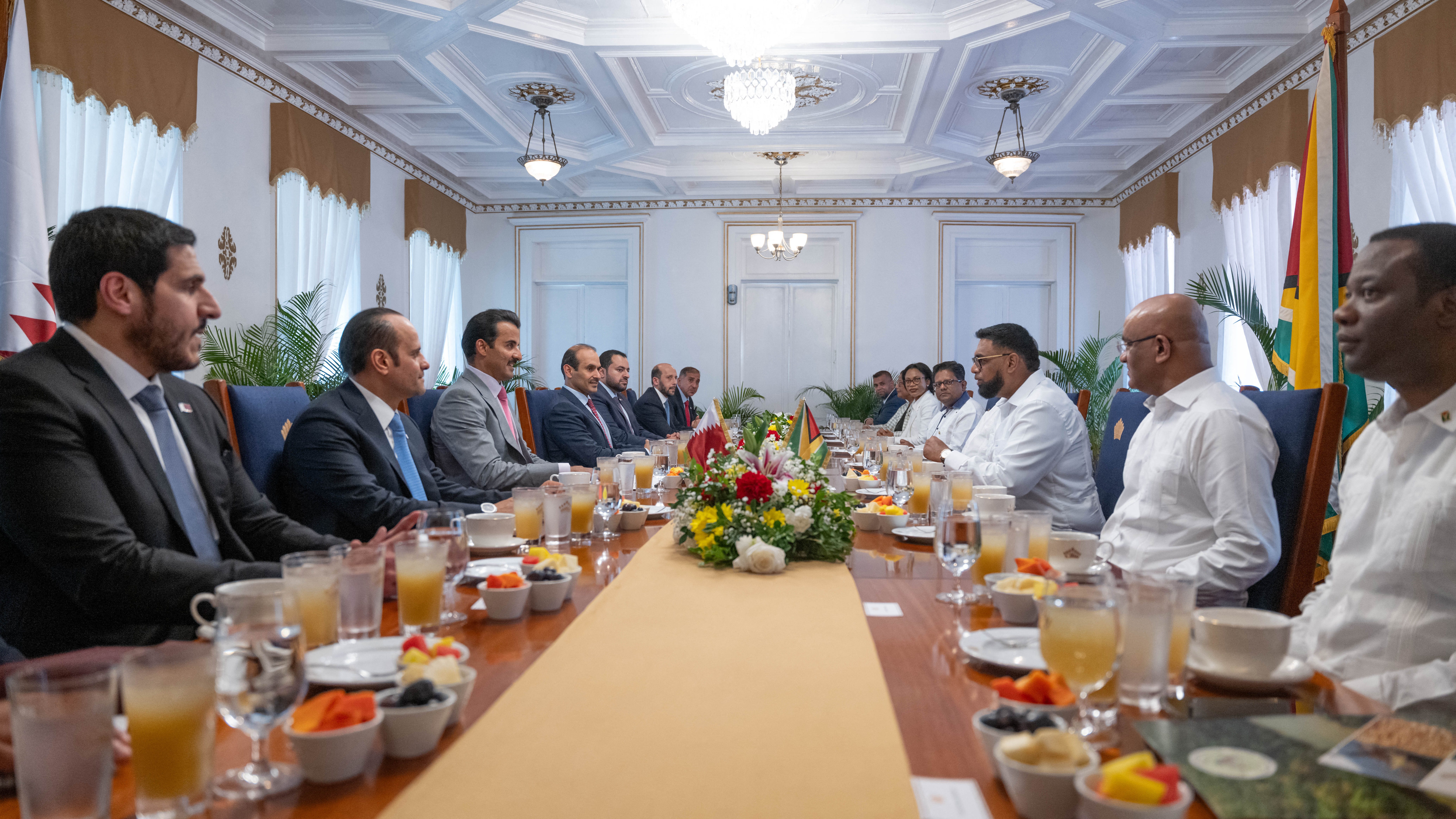Qatar has garnered significant global attention for its role in negotiating the release of hostages held by Hamas after its attack on Israel on October 7. The Gulf state’s recent mediation efforts have also extended beyond the borders of its own region, particularly in Latin America where its economic and diplomatic channels are widening.
On October 17, the government of Venezuela and a group of opposition parties agreed to establish conditions for a competitive presidential election in 2024—a potentially landmark deal that triggered the easing of U.S. sanctions on the country’s oil sector. This breakthrough was reportedly the outcome of several meetings in Qatar over the past year.
The Gulf state’s experience as an intermediary between the U.S. and Venezuela now presents it with an opportunity to mediate in a long-standing border dispute between Venezuela and neighboring Guyana. Ahead of an upcoming Venezuelan referendum on the dispute, the current moment is a critical juncture where mediation and efforts promoting de-escalation are vital.
Easing Venezuela-Guyana tensions would have major implications for stability in Latin America and for global energy markets. It would also allow Doha to further expand its economic footprint in the oil and gas-rich area. However, mediating the century-old dispute—which is the subject of a case at the International Court of Justice (ICJ)—could pose a delicate dilemma for Doha as it seeks to balance its ties with Caracas and viability as an impartial mediator against its relations with Western states and the international institutions they dominate.
However, few states have as much experience at this balancing act as Qatar, whose previous mediation efforts have engaged a wide spectrum of state and non-state actors from the United States and Israel to Iran and the Taliban.
Building on Barbados
When Venezuelan President Nicolás Maduro and an opposition grouping known as the Unity Platform signed the Barbados deal last month, it was welcomed as a potential breakthrough in efforts to resolve Venezuela’s deep political and socio-economic woes that have spurred the region’s worst migration crisis. Although the United States was not party to the agreement, it promptly endorsed it and eased sanctions on Venezuela, marking a turning point in U.S. policy towards Caracas following the Trump administration’s failed “maximum pressure” approach.
Washington’s move followed several meetings between U.S. and Venezuelan diplomats in Doha earlier this year that were crucial in the lead-up to the Barbados deal. This role has laid the groundwork for Qatar to mediate between Venezuela and Guyana. Moreover, Doha has already stepped up its engagement with both sides. President Maduro met Qatar’s Minister of State for Foreign Affairs in late September, and Venezuela’s Vice President visited Doha in early October. Qatar’s Emir Sheikh Tamim bin Hamad Al Thani also hosted Guyana’s President Mohamed Irfaan Ali in Doha in May. These visits demonstrate significant investment from top Qatari leadership in relations with this part of Latin America.
Yet serving as an intermediary between Venezuela and Guyana could bring to the surface competing foreign policy aims. Doha wants to preserve the strategic neutrality that has made it an appealing mediator to Venezuela, Iran, and other states and actors—notably Hamas—ostracized by Western-dominated international institutions. Qatar has faced intense backlash for hosting a Hamas political office, with former U.S. officials, members of Congress, and a presidential candidate calling for increased diplomatic pressure or even military action against Hamas on Qatari soil. All these critiques conveniently fail to recognize that the Hamas backchannel was initiated at the request of the United States and benefits U.S. interests. Carefully calibrating these priorities and securing more positive outcomes from its Hamas-Israel mediaton will be crucial for Doha to maintain its efficacy and reputation as an effective intermediary.
Mediating this rift will not be an easy task. The territorial dispute between Guyana and Venezuela over the Esequiba region on their border dates back to the late nineteenth century. Venezuela claims it was cheated out of territory amounting to nearly two-thirds of present-day Guyana. In recent years, the dispute has been fuelled by the discovery of major oil reserves in the border region’s offshore territory, which could position Guyana as a major player in Latin American oil production. An ExxonMobil drilling ship was forced to halt its operations in 2018 after an encounter with the Venezuelan navy near the maritime border.
Tensions heightened further in September, when Guyana fielded another round of bids for offshore oil and gas exploration rights in the disputed territory. In response, Venezuela’s National Assembly approved a referendum on the issue. Addressing the United Nations General Assembly, Venezuelan Foreign Minister Yvan Gil framed the dispute as a battle against U.S. imperialism and militarization of the region, saying the referendum was intended to “ratify the defense of our sovereign territory against the aggressions of the American empire, which wants to lead us to a war for natural resources.” In response, Guyana summoned the Venezuelan ambassador and warned that the referendum might lead to further escalation.
The United States, for its part, has said it “supports Guyana’s sovereign right to develop its own natural resources,” and backed Guyana’s position that any ICJ ruling should be respected. The ICJ has already affirmed its jurisdiction over the dispute, rejecting a Venezuelan attempt to stall the process by asserting that the United Kingdom, former colonial ruler of Guyana, was an “indispensable third party” to the dispute. Most recently, Maduro called on UN Secretary General Antonio Guterres to intervene.
Given the looming referendum, set for December 3, and ongoing tensions which the Maduro administration appears to be exacerbating as a political distraction, efforts to de-escalate the situation and encourage dialogue are imperative. However, the vote will be non-binding and function largely as a tool to foment popular support ahead of next year’s election. Despite the Barbados deal, Maduro’s administration has continued to undermine the opposition, alleging fraud in a recent primary.
As the November 30 deadline approaches for Venezuela to meet the initial terms of the Barbados deal, Qatar’s growing, high-level engagement affords the country influence that it can leverage in the Guyana-Venezuela rift as a neutral, yet increasingly invested, actor.
Qatar’s Growing Engagement
The recent diplomatic visits are only the surface of the ties that Qatar has been cultivating with Latin American nations, which also include Brazil, El Salvador, and Argentina. Many of these relationships are focused on energy and agricultural cooperation. Additionally, Qatar has long-term interests in Venezuela, home to the world’s largest confirmed oil fields. The potential for closer cooperation on energy production could be mutually beneficial for Qatar, Guyana, and Venezuela, offering a strategic advantage and greater collective influence over global energy markets.
However, Venezuela’s reluctance to recognize the ICJ as an arbiter may pose a dilemma for Qatar. The referendum lays the groundwork for the Venezuelan regime—and public—to reject any ICJ ruling in Guyana’s favor by framing the process as corrupted by U.S. interests. Were this to be the case, it would raise the question of whether Doha should prioritize its reputation for neutrality and working relations with Venezuela, or its commitment to international institutions. The two may not be entirely mutually exclusive, but will require careful diplomacy. The UN’s toothless response to Israel’s ongoing genocide in Gaza and perpetration of war crimes in both Lebanon and Palestine are only making it easier for Maduro to reject any ICJ ruling, as it has exposed the hypocrisy of the Western-dominated “rules-based” international order and undermined any scrap of remaining legitimacy.
Mediating in this dispute would require a careful diplomatic balancing act to remain a viable mediator in Venezuela’s eyes while continuing its commitments to the international system. That said, few states have walked this tightrope so frequently as Qatar, such as in its dealings with Iranian officials, the Taliban, and Hamas. Moreover, the country’s expanding diplomatic footprint in Latin America, particularly in facilitating talks between the U.S. and Venezuela, positions it as a strong potential intermediary in the Guyana-Venezuela dispute.
The stakes are high: the outcome of the dispute will not only impact the two nations involved but also have broader implications for energy markets and regional stability. Qatar’s role in facilitating dialogue and encouraging de-escalation could be pivotal to ameliorating this longstanding conflict.

